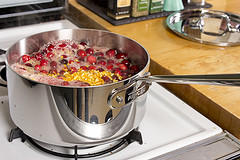The only thing that can ruin your Thanksgiving more than burning the turkey is an illness or injury. Although Thanksgiving is meant to be enjoyable, having too many cooks in the kitchen can put everyone at risk. Here are a few simple ways to keep your friends and family safe this Turkey Day.
- Never leave children unattended in the kitchen. With so many things on the stove and in the oven, it is far too dangerous for little ones to wander around.
- Thaw meat completely to prevent foodborne illnesses. Because the turkey is so large it requires more than one full day to thaw completely, so be sure to provide ample time for thawing before you cook it.
- Wash hands after handling raw meat or stuffing the turkey.
- Check the internal temperature of the turkey after cooking to ensure that it is cooked completely through. The bird should be around 180 degrees F inside, and the stuffing should be around 165 degrees F.
- Always point knives away from you when cutting, and be sure to use a very sharp knife that doesn’t require much force to cut food.
- Clean grease from countertops and stovetops in order to prevent grease fires. This also goes for towels with grease on them.
- Keep a first aid kit in the kitchen. You never know what can happen, and it’s better to be safe than sorry.
Thanksgiving Safety [National Fire Protection Association]
It's Turkey Time: Safely Prepare Your Holiday Meal [CDC]
Cooking Safety Tips for Thanksgiving Chefs [American Red Cross]


 Equal Housing Opportunity
Equal Housing Opportunity